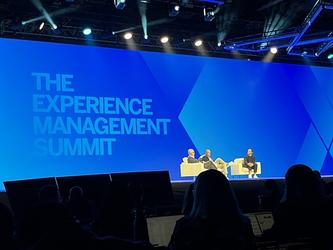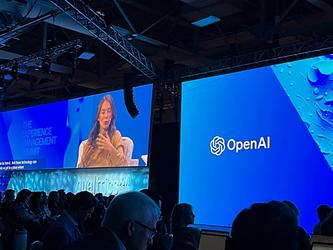A pinch of salt: Reflections on data, AI and culture in Salt Lake City

Nestled in the Rocky Mountains and abutted by the numerous national parks, Salt Lake City is, perhaps, an odd choice for a technology conference. However, earlier this month, the city’s Mormon temples, ski fields and the great saltwater lake from which it takes its name bore witness to 10,000 delegates and much discussion of the future of artificial intelligence (AI).
Qualtrics, which is headquartered in the city, hosted its annual X4 conference on 1st and 2nd May, and among several high-profile speakers, including former First Lady Michelle Obama, AI was the primary concern.
Senior figures at Qualtrics had plenty to say on the subject of AI. Gurdeep Singh Pall, president of AI at the company, and formerly of Microsoft, said that he believed AI’s most important impact would be understanding humans deeply at scale. “The kind of changes that are going to come with the world of AI are ones that, frankly, are ones we couldn’t even imagine in the world of deterministic and algorithmic computing,” he told the conference. “The interface between the human and the machine is going to be completely redefined with AI.”
Brad Anderson, head of product, engineering and user experience at Qualtrics, also talked up the need for businesses to build their own bespoke AI systems. “Eventually every organisation on the planet will be using AI,” he said. “But it will be the organisations using specialised AI, purpose-built for their domains, that will have the advantage.”
But Qualtrics was far from the only source of AI news at the conference. OpenAI has been the biggest name in generative AI for the past two years and provided some of the biggest talking points in Salt Lake City. Safety was at the forefront of OpenAI chief technology officer Mira Murati’s keynote address. “Of course we need to develop the capabilities of these models, and make them more powerful, robust and useful,” Murati said. “But hand in hand with that goes also the safety of these models and making them more aligned with human values and making sure that they are doing the things we are trying to do, whether that’s an explicit direction or implicit direction.”
Building excitement
AI was not the only subject of discussion. In a keynote, Robert Ader, chief marketing officer at Porsche, said that the company had changed how it measured consumer experience to focus to a greater extent on ‘excitement’ rather than ‘satisfaction’, which he said was a better metric for a sports car company. “Our ultimate goal is not customer satisfaction but customer excitement,” Ader said. “This is what we want our customers to feel, and this is what drives loyalty.
“The excitement drivers are sometimes different to the satisfaction drivers. The week of delivery for example – what really excites people is the personality of the people explaining the car, or the way the dealer makes the delivery a very personalised experience.”
This idea of ‘excitement’ also cropped up in a talk by Lauren Cheatham, principal quantitative researcher at Roblox, albeit regarding the employee experience. “We often lose sight of the importance of fun,” Cheatham said. “If I am not having fun, I am not showing up, and it matters more than anything else.”
Roblox is at the vanguard of new technology firms, with a focus on social aspects of the so-called ‘metaverse’. Cheatham explained how the company wanted to learn more about the ‘creators’ that operate on its platform and how the could be engaged and excited effectively: “What do we know about our creators and users today? What do we not know about our creators and users? And how do we know we are doing right by our creators?”
Data is vital in building good customer experience, and success often boils down to getting the right data and understanding how to use it effectively. Lindsay Vonn, former Olympic and world champion skier, spoke of the importance of data in the world of sport. “I love data,” Vonn explained. “The more data I have, the more informed I am and the better I can make decisions.
“The more information I had, the better prepared I felt. The more data I collected, the stronger an athlete I felt I could be and the better prepared I felt I was for any situation. In ski racing there are so many variables. The more information you have to adapt to those situations, the better.”
How do you use data to succeed? “You still have to make changes quickly,” Vonn said. “You can get a lot of data, but you still have to have your instincts. Data doesn't take away the human component – the decision making and the gut instinct.
“Data is information, it can empower you, but you still have to be the one to trust yourself and make those decisions.”
New experience
Christopher Nassetta, president and chief executive officer at Hilton, said that the hotel industry was ripe for disruption in the way it measured customer experience. “We do not do as well as we should,” he said. “We have not broken away in a meaningful way from the competition in a way I think we can.
“I think the industry, broadly, has been slow to innovate and slow and backward thinking in how we think about product, service and the whole customer experience. The whole industry has been built looking in a rearview mirror. Everything in the last 100 years is a rearview mirror of ‘let’s find out after our customers leave and they have a bad experience, how we did’. That is obviously a horrifically bad way to deal with your customers.”
Nassetta said he wanted issues to be addressed ‘in the moment’ rather than retrospectively, saying: “It is listening. Life is about ‘ask, listen and then act’. When we think about customer service, we need to be asking more and we need to be listening.”
Culture was a running theme. Dr Richard Linton, assessment branch head and navy survey program manager at the Office of the Chief of Naval Operations (OPNAV), described his work researching culture in the US Navy, and identified cohesion, commitment, trust, connectedness and job satisfaction as key factors in good workplace cultures.
Linton said that many commands in the Navy are struggling with their culture and there was a need to look at how to help senior officers address the issue, with data helping to identify indicators that a unit had an issue that might not otherwise be obvious to leadership. “How to measure culture? It’s hard, but it is not that hard if you have the right measures.”
Author Morgan Housel summarised the mentality needed to make a company – or any organisation, for that matter – successful. A key element is to focus on the established, sure bet – a Snickers or a Coca-Cola – rather than jumping onto the latest trend or fashion. “Don’t waste your time trying to figure out what is going to change, as that is very difficult to do. Instead, find something that is not going to change and put all of your efforts into that.”
Most importantly, make sure expectations are kept in check. “What has happened over the last 80 years is our incomes have doubled, but our expectations have more than doubled,” Housel said. “Social media makes this harder than ever, as you are comparing yourself to a curated highlights reel of everyone else’s life.
“A takeaway from this that has always been true, and will always be true, is that if your expectations grow faster than your income, you will never be happy with your money.” As technology continues to grow apace, especially AI, it remains to be seen if the sunny optimism in Salt Lake City comes to fruition.

We hope you enjoyed this article.
Research Live is published by MRS.
The Market Research Society (MRS) exists to promote and protect the research sector, showcasing how research delivers impact for businesses and government.
Members of MRS enjoy many benefits including tailoured policy guidance, discounts on training and conferences, and access to member-only content.
For example, there's an archive of winning case studies from over a decade of MRS Awards.
Find out more about the benefits of joining MRS here.














0 Comments